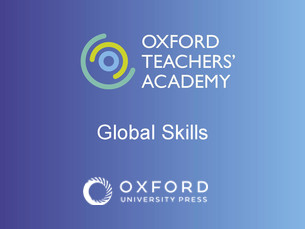Global Skills
In a fast-evolving world, it is increasingly recognised that education needs to cover more than just traditional subjects if students are going to be equipped to flourish now and in the future.
This Oxford Teacher’s Academy course suggests ways that we can bring added value to English classes by incorporating the following clusters of Global Skills, which are critical for lifelong learning and success:
- Communication and Collaboration
- Creativity and Critical Thinking
- Intercultural Competence and Citizenship
- Emotional Self-Regulation and Wellbeing
- Digital Literacies
Using reflective, exploratory and collaborative methods, the course examines the language-learning applications of each skills-cluster. It also focuses on how Global Skills can be assessed, and suggests strategies for creating a Global Skills learning environment -- one that benefits both students and teacher. Teachers of all contexts will find practical suggestions and workable strategies for promoting Global Skills within the English lesson, without needing to overhaul either the curriculum or the teaching timetable.
*Only available for educational institutions

During this course you will:
- Become aware of what Global Skills are in relation to 21st Century Skills in order to relate to the need to introduce them and select areas for future professional development.
- Explore the nature of successful communication and collaboration inside and outside the classroom by analysing what makes activities communicative and collaborative.
- Establish the importance of intercultural communication and competence, and explore the idea that students are citizens of several different communities. Predict areas of interest for students in citizenship (both locally and globally).
- Look at what is meant by “emotional self-regulation and wellbeing” in the context of the English Language Classroom and to suggest ways that we can help both students and ourselves as teachers to develop these skills.
- Look at what creativity and critical thinking skills are, why they are needed in all aspects of life, and how they can be developed in the English classroom.
- See the importance of assessing Global Skills and practical ways of doing it in the language classroom. There is also a collaborative teacher project to explore content options for learner portfolios.
- Look at what digital literacies (DL) are and to establish best practices for teaching these skills in the English Language classroom; to identify the DL we would like to develop and maintain as teachers.
- Identify components that assist learning in the classroom and to recognise the role of Global Skills as learning skills; to establish the impact of the teacher’s attitudes, knowledge, and skills; to put theory into practice through lesson planning.
Need more information?
We are glad to help you find the best option for your classes
